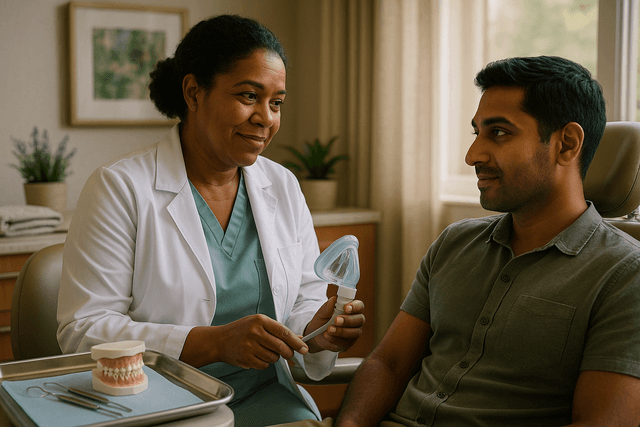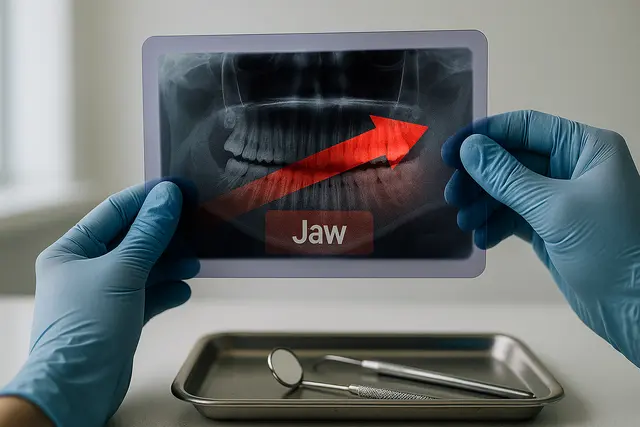Oral Health
Canker Sore From Dental Work: Dentist-Recommended Relief Options
Canker sores can be a painful and frustrating surprise, especially when they pop up after a visit to the dentist. While they’re small in size, these mouth ulcers can cause major discomfort and make eating or talking a challenge. Understanding why they form after dental work and how to treat them effectively can make all the difference in your recovery.
5 min read
Aug 07, 2025

Understanding Canker Sores and Why They Happen
If you’ve ever woken up after a dental appointment only to find a painful little crater inside your mouth, you’re not alone. A canker sore may not seem like a big deal, but when it’s making every bite feel like a wrestling match with a lemon, it’s a problem.
Canker sores, also known as aphthous ulcers, are small, shallow, open sores that appear in the mouth. They can show up on the inside of your lips, cheeks, the roof of your mouth, and even your tongue. These painful ulcers often show up when you least expect them, and sometimes right after a dental procedure.
Unlike cold sores, which are caused by a virus and show up outside the mouth, canker sores are not contagious and are found inside your mouth. They can also be incredibly annoying, especially if you’re trying to enjoy food, talk, or just go about your day without wincing.
Dental Work and the Not-So-Welcome Canker Sore
So, why do canker sores appear after dental work? Blame it on trauma. Even a simple dental cleaning or more involved dental treatments like a root canal procedure or tooth extraction can irritate or damage soft tissues in the mouth. That trauma to the mouth, accidental cheek biting during numbing, a jab from an instrument, or stress from keeping your mouth open, can cause canker sores to appear within a day or two.
Some patients even develop canker sores after tooth extraction or other dental procedures simply because their tissues in the mouth are already sensitive, and the stress or friction is enough to spark a flare-up. Canker sores after a tooth extraction are surprisingly common. In fact, the chance of canker sores showing up after dental work is higher than most people think.
Symptoms of Canker Sores You Shouldn't Ignore
Canker sores usually start with a burning or tingling sensation. That’s your first clue. You might feel the tingle before the sore even appears. Then, a small, round ulcer with a white or yellowish center and a red border forms. It might be painful to the touch or when you eat, drink, or talk.
The symptoms of canker sores include:
Pain and discomfort inside the mouth
Swelling around the sore
Difficulty eating spicy, acidic, or crunchy foods
Sores may appear solo or in clusters. If they show up in groups, that’s when things really start to feel unfair.
There are different types of canker sores, too:
Minor canker sores: Most common; usually heal in about a week
Major canker sores: Larger, may take longer to heal
Herpetiform sores: Tiny but numerous (not related to herpes)
In short, canker sores are a common pain that comes in multiple flavors of misery.
What Can Cause Canker Sores to Develop
The exact cause of canker sores remains unclear, but there are a few usual suspects. Trauma, as mentioned, is a big one. This includes accidental bites, toothbrush mishaps, and, yes, dental work. Other things that cause canker sores include:
Stress
Nutritional deficiencies (like low B12 or iron)
Food sensitivities
Hormonal changes
Some people are just more prone to them. If you’re the type who tends to get canker sores on your tongue after spicy food or during stressful weeks, your body may simply be more reactive.
Dry mouth, which sometimes follows a dental procedure or certain medications, can also increase your risk. It creates an environment where the soft tissues are more easily irritated. Combine that with minor mouth injuries, and you’ve got a recipe for a mouth ulcer.
Treat Canker Sores With These Dentist-Approved Solutions
The good news? You can treat canker sores effectively at home, no need to suffer in silence or give up crunchy snacks forever.
Start by rinsing your mouth with salt water. It’s one of the oldest tricks in the dental care book and works like a charm. Rinsing your mouth with salt water can help clean the area, reduce inflammation, and speed healing.
Another go-to is a hydrogen peroxide rinse. It helps disinfect and may help relieve pain. Just make sure it's diluted properly, don’t swig the stuff straight from the bottle.
Over-the-counter gels and patches can also help. These create a barrier over the sore, protecting it from food, saliva, and further irritation. Pain relievers are also commonly used to treat canker sores. If you're in serious pain, don’t hesitate to pop an ibuprofen (as directed, of course).
If the sore is especially stubborn or painful, consult your dentist. A dental professional can prescribe medicated rinses, corticosteroid ointments, or even laser treatments to speed up healing. If your canker sores persist, it’s definitely worth getting a second look.
Prevent Canker Sores Before They Start
Here’s the part we love: prevention. While you can’t always prevent canker sores, you can lower your chances.
First, keep your mouth clean. That means brushing gently, flossing regularly, and avoiding harsh mouthwashes with alcohol that dry out the tissues. Keeping your oral health in check plays a huge role.
Next, watch what you eat. If you tend to get canker sores after eating acidic or spicy foods, consider cutting back a bit. Avoiding foods that irritate the inside of your mouth can be a game-changer.
Don’t forget hydration. Dry mouth can increase your risk of sores, so drink plenty of water, especially after a dental procedure or during stressful weeks.
You can also talk to your dentist about using a softer toothbrush, especially after dental treatments. That small switch may help prevent canker sores in the long run.
Getting a Canker Sore Doesn’t Mean You Have to Suffer
Getting a canker sore after a dental procedure feels like adding insult to injury. You just powered through an extraction or root canal, and now your reward is a painful sore inside your mouth? Not cool.
But the silver lining is that most canker sores heal without scarring in one to two weeks. With the right steps, you can alleviate pain, speed up healing, and maybe even prevent canker sores from forming in the future.
If your sores are unusually large, last more than two weeks, or come with other symptoms like fever or swollen glands, check in with your dentist. Persistent or severe symptoms shouldn’t be ignored, especially if sores typically heal quickly for you.
Why Do Canker Sores Sometimes Appear After Dental Work?
Canker sores can develop after dental procedures due to irritation or minor trauma to the soft tissues inside your mouth. Keeping your mouth open for extended periods, accidental cheek biting, or friction from dental instruments can trigger these ulcers, especially if you're already prone to them.
How Can I Tell If It’s a Canker Sore and Not Something Else?
Canker sores typically appear as small, round ulcers with a white or yellow center and a red border. They’re found inside the mouth, on the cheeks, tongue, lips, or gums, and are often painful, especially when eating or drinking. Unlike cold sores, they’re not contagious and don’t appear on the lips or skin.
What Are the Best Ways to Treat a Canker Sore at Home?
Start by rinsing with salt water or a diluted hydrogen peroxide solution to reduce bacteria and promote healing. Over-the-counter gels and patches can shield the sore from irritation. Taking anti-inflammatory pain relievers like ibuprofen can also help. For persistent or severe sores, consult your dentist for prescription treatments.
How Can I Prevent Canker Sores From Coming Back?
To reduce your risk, maintain good oral hygiene with a soft-bristled toothbrush and avoid foods that irritate your mouth, like spicy or acidic items. Stay hydrated, manage stress, and use alcohol-free mouthwash. If your sores are frequent, talk to your dentist about possible underlying causes, such as nutritional deficiencies or dry mouth.
Read Next
Related Posts

Oral Health
How a Dentist for Anxiety Patients Makes Dental Care Easier
For many people, visiting the dentist is a routine part of staying healthy. For others, it’s a source of intense stress and fear that can keep them from getting the care they need. Dental anxiety is more common than you might think, and it can have serious effects on both oral and overall health. Sedation dentistry offers a safe, effective way to make dental visits calmer, more comfortable, and easier to manage.
5 min read
Aug 12, 2025

Oral Health
Signs You Might Have a Bacterial Infection in Your Jaw
Jaw pain might seem like a minor issue at first, but it can sometimes point to something far more serious, a bacterial infection deep within the bone. These infections can develop quickly and become dangerous if left untreated. Understanding the early warning signs is crucial for protecting your health and avoiding complications.
4 min read
Aug 07, 2025

Oral Health
Best Ways to Find a Dentist Who Takes Payments Without Insurance
Struggling to afford dental care without insurance? You’re not alone. With rising healthcare costs, many people are looking for practical ways to maintain their oral health without breaking the bank. Fortunately, there are dentists and clinics that understand this challenge, and offer flexible, budget-friendly solutions tailored to patients without coverage.
3 min read
Aug 06, 2025
Don’t have time to research every dentist around you?
See why 30k+ patients trusted us